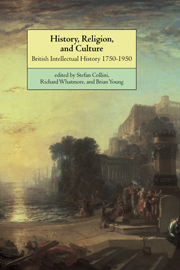Book contents
- Frontmatter
- Contents
- Preface
- General introduction
- Presentation of History, Religion, and Culture
- Part I
- Part II
- 4 ‘The Lust of Empire and Religious Hate’: Christianity, history, and India, 1790–1820
- 5 The Victorians and Oliver Cromwell
- 6 Religion and politics in the Quarterly Review, 1809–1853
- 7 Ruskin's way: tout à fait comme un oiseau
- Part III
- List of contributors
- Acknowledgements
- Index
5 - The Victorians and Oliver Cromwell
Published online by Cambridge University Press: 03 December 2009
- Frontmatter
- Contents
- Preface
- General introduction
- Presentation of History, Religion, and Culture
- Part I
- Part II
- 4 ‘The Lust of Empire and Religious Hate’: Christianity, history, and India, 1790–1820
- 5 The Victorians and Oliver Cromwell
- 6 Religion and politics in the Quarterly Review, 1809–1853
- 7 Ruskin's way: tout à fait comme un oiseau
- Part III
- List of contributors
- Acknowledgements
- Index
Summary
From time to time the anniversary of a historical episode, or of the birth or death of a historical figure, touches a nation's nerve. It answers to perceptions of national identity; or it prompts the invocation of the past for present causes. One such event is the Shakespeare bicentenary of 1764. Another is the centenary of the Glorious Revolution in 1788. No English centenary, however, has produced a more prodigious intensity of sentiment than the three-hundredth anniversary, in April 1899, of the birth of Oliver Cromwell. Across the country there were fervent gatherings of his admirers. In the City Temple in Holborn, which held more than 3,000 people, a series of meetings, from which hundreds had to be turned away, lasted from noon till night. The tercentenary prompted a succession of biographies, most of them deeply felt. There was extensive commentary and debate in the press. The building of a statue of Cromwell at Westminster, which had been demanded and opposed for more than half a century, was finally accomplished.
The years around the tercentenary are the climax of a movement of enthusiasm for Cromwell, even of a cult of him. The movement is essentially a Victorian one. It becomes pronounced at the beginning of Victoria's reign and declines after its end. With its emergence the verdict of previous times was reversed. The eighteenth and early nineteenth centuries, it can be broadly said, were hostile to Cromwell. They vilified him on account both of his revolutionary deeds – the regicide, the establishment of a republic, military and sectarian rule – and of his character, which was generally held to have been one of ruthless cunning and ambition and hypocrisy.
- Type
- Chapter
- Information
- History, Religion, and CultureBritish Intellectual History 1750–1950, pp. 112 - 135Publisher: Cambridge University PressPrint publication year: 2000



